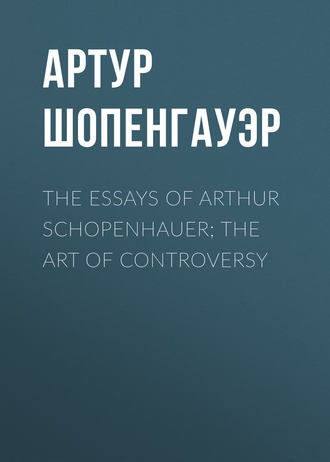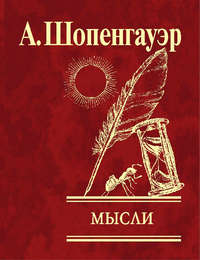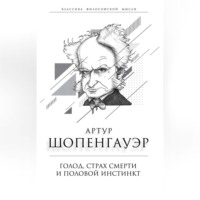 полная версия
полная версияThe Essays of Arthur Schopenhauer; the Art of Controversy
Now, since the interest of a work of art lies in the fact that we have the same kind of sympathy with a poetic representation as with reality, it is obvious that the representation must deceive us for the moment; and this it can do only by its truth. But truth is an element in perfect art. A picture, a poem, should be as true as nature itself; but at the same time it should lay stress on whatever forms the unique character of its subject by drawing out all its essential manifestations, and by rejecting everything that is unessential and accidental. The picture or the poem will thus emphasize its idea, and give us that ideal truth which is superior to nature.
Truth, then, forms the point that is common both to interest and beauty in a work of art, as it is its truth which produces the illusion. The fact that the truth of which I speak is ideal truth might, indeed, be detrimental to the illusion, since it is just here that we have the general difference between poetry and reality, art and nature. But since it is possible for reality to coincide with the ideal, it is not actually necessary that this difference should destroy the illusion. In the case of fine arts there is, in the range of the means which art adopts, a certain limit, and beyond it illusion is impossible. Sculpture, that is to say, gives us mere colourless form; its figures are without eyes and without movement; and painting provides us with no more than a single view, enclosed within strict limits, which separate the picture from the adjacent reality. Here, then, there is no room for illusion, and consequently none for that interest or sympathy which resembles the interest we have in reality; the will is at once excluded, and the object alone is presented to us in a manner that frees it from any personal concern.
It is a highly remarkable fact that a spurious kind of fine art oversteps these limits, produces an illusion of reality, and arouses our interest; but at the same time it destroys the effect which fine art produces, and serves as nothing but a mere means of exhibiting the beautiful, that is, of communicating a knowledge of the ideas which it embodies. I refer to waxwork. Here, we might say, is the dividing line which separates it from the province of fine art. When waxwork is properly executed, it produces a perfect illusion; but for that very reason we approach a wax figure as we approach a real man, who, as such, is for the moment an object presented to our will. That is to say, he is an object of interest; he arouses the will, and consequently stills the intellect. We come up to a wax figure with the same reserve and caution as a real man would inspire in us: our will is excited; it waits to see whether he is going to be friendly to us, or the reverse, fly from us, or attack us; in a word, it expects some action of him. But as the figure, nevertheless, shows no sign of life, it produces the impression which is so very disagreeable, namely, of a corpse. This is a case where the interest is of the most complete kind, and yet where there is no work of art at all. In other words, interest is not in itself a real end of art.
The same truth is illustrated by the fact that even in poetry it is only the dramatic and descriptive kind to which interest attaches; for if interest were, with beauty, the aim of art, poetry of the lyrical kind would, for that very reason, not take half so great a position as the other two.
In the second place, if interest were a means in the production of beauty, every interesting work would also be beautiful. That, however, is by no means the case. A drama or a novel may often attract us by its interest, and yet be so utterly deficient in any kind of beauty that we are afterwards ashamed of having wasted our time on it. This applies to many a drama which gives no true picture of the real life of man; which contains characters very superficially drawn, or so distorted as to be actual monstrosities, such as are not to be found in nature; but the course of events and the play of the action are so intricate, and we feel so much for the hero in the situation in which he is placed, that we are not content until we see the knot untangled and the hero rescued. The action is so cleverly governed and guided in its course that we remain in a state of constant curiosity as to what is going to happen, and we are utterly unable to form a guess; so that between eagerness and surprise our interest is kept active; and as we are pleasantly entertained, we do not notice the lapse of time. Most of Kotzebue's plays are of this character. For the mob this is the right thing: it looks for amusement, something to pass the time, not for intellectual perception. Beauty is an affair of such perception; hence sensibility to beauty varies as much as the intellectual faculties themselves. For the inner truth of a representation, and its correspondence with the real nature of humanity, the mob has no sense at all. What is flat and superficial it can grasp, but the depths of human nature are opened to it in vain.
It is also to be observed that dramatic representations which depend for their value on their interest lose by repetition, because they are no longer able to arouse curiosity as to their course, since it is already known. To see them often, makes them stale and tedious. On the other hand, works of which the value lies in their beauty gain by repetition, as they are then more and more understood.
Most novels are on the same footing as dramatic representations of this character. They are creatures of the same sort of imagination as we see in the story-teller of Venice and Naples, who lays a hat on the ground and waits until an audience is assembled. Then he spins a tale which so captivates his hearers that, when he gets to the catastrophe, he makes a round of the crowd, hat in hand, for contributions, without the least fear that his hearers will slip away. Similar story-tellers ply their trade in this country, though in a less direct fashion. They do it through the agency of publishers and circulating libraries. Thus they can avoid going about in rags, like their colleagues elsewhere; they can offer the children of their imagination to the public under the title of novels, short stories, romantic poems, fairy tales, and so on; and the public, in a dressing-gown by the fireside, sits down more at its ease, but also with a greater amount of patience, to the enjoyment of the interest which they provide.
How very little aesthetic value there generally is in productions of this sort is well known; and yet it cannot be denied that many of them are interesting; or else how could they be so popular?
We see, then, in reply to our second question, that interest does not necessarily involve beauty; and, conversely, it is true that beauty does not necessarily involve interest. Significant characters may be represented, that open up the depths of human nature, and it may all be expressed in actions and sufferings of an exceptional kind, so that the real nature of humanity and the world may stand forth in the picture in the clearest and most forcible lines; and yet no high degree of interest may be excited in the course of events by the continued progress of the action, or by the complexity and unexpected solution of the plot. The immortal masterpieces of Shakespeare contain little that excites interest; the action does not go forward in one straight line, but falters, as in Hamlet, all through the play; or else it spreads out in breadth, as in The Merchant of Venice, whereas length is the proper dimension of interest; or the scenes hang loosely together, as in Henry IV. Thus it is that Shakespeare's dramas produce no appreciable effect on the mob.
The dramatic requirement stated by Aristotle, and more particularly the unity of action, have in view the interest of the piece rather than its artistic beauty. It may be said, generally, that these requirements are drawn up in accordance with the principle of sufficient reason to which I have referred above. We know, however, that the idea, and, consequently, the beauty of a work of art, exist only for the perceptive intelligence which has freed itself from the domination of that principle. It is just here that we find the distinction between interest and beauty; as it is obvious that interest is part and parcel of the mental attitude which is governed by the principle, whereas beauty is always beyond its range. The best and most striking refutation of the Aristotelian unities is Manzoni's. It may be found in the preface to his dramas.
What is true of Shakespeare's dramatic works is true also of Goethe's. Even Egmont makes little effect on the public, because it contains scarcely any complication or development; and if Egmont fails, what are we to say of Tasso or Iphigenia? That the Greek tragedians did not look to interest as a means of working upon the public, is clear from the fact that the material of their masterpieces was almost always known to every one: they selected events which had often been treated dramatically before. This shows us how sensitive was the Greek public to the beautiful, as it did not require the interest of unexpected events and new stories to season its enjoyment.
Neither does the quality of interest often attach to masterpieces of descriptive poetry. Father Homer lays the world and humanity before us in its true nature, but he takes no trouble to attract our sympathy by a complexity of circumstance, or to surprise us by unexpected entanglements. His pace is lingering; he stops at every scene; he puts one picture after another tranquilly before us, elaborating it with care. We experience no passionate emotion in reading him; our demeanour is one of pure perceptive intelligence; he does not arouse our will, but sings it to rest; and it costs us no effort to break off in our reading, for we are not in condition of eager curiosity. This is all still more true of Dante, whose work is not, in the proper sense of the word, an epic, but a descriptive poem. The same thing may be said of the four immortal romances: Don Quixote, Tristram Shandy, La Nouvelle Heloïse, and Wilhelm Meister. To arouse our interest is by no means the chief aim of these works; in Tristram Shandy the hero, even at the end of the book, is only eight years of age.
On the other hand, we must not venture to assert that the quality of interest is not to be found in masterpieces of literature. We have it in Schiller's dramas in an appreciable degree, and consequently they are popular; also in the Oedipus Rex of Sophocles. Amongst masterpieces of description, we find it in Ariosto's Orlando Furioso; nay, an example of a high degree of interest, bound up with the beautiful, is afforded in an excellent novel by Walter Scott —The Heart of Midlothian. This is the most interesting work of fiction that I know, where all the effects due to interest, as I have given them generally in the preceding remarks, may be most clearly observed. At the same time it is a very beautiful romance throughout; it shows the most varied pictures of life, drawn with striking truth; and it exhibits highly different characters with great justice and fidelity.
Interest, then, is certainly compatible with beauty. That was our third question. Nevertheless, a comparatively small admixture of the element of interest may well be found to be most advantageous as far as beauty is concerned; for beauty is and remains the end of art. Beauty is in twofold opposition with interest; firstly, because it lies in the perception of the idea, and such perception takes its object entirely out of the range of the forms enunciated by the principle of sufficient reason; whereas interest has its sphere mainly in circumstance, and it is out of this principle that the complexity of circumstance arises. Secondly, interest works by exciting the will; whereas beauty exists only for the pure perceptive intelligence, which has no will. However, with dramatic and descriptive literature an admixture of interest is necessary, just as a volatile and gaseous substance requires a material basis if it is to be preserved and transferred. The admixture is necessary, partly, indeed, because interest is itself created by the events which have to be devised in order to set the characters in motion; partly because our minds would be weary of watching scene after scene if they had no concern for us, or of passing from one significant picture to another if we were not drawn on by some secret thread. It is this that we call interest; it is the sympathy which the event in itself forces us to feel, and which, by riveting our attention, makes the mind obedient to the poet, and able to follow him into all the parts of his story.
If the interest of a work of art is sufficient to achieve this result, it does all that can be required of it; for its only service is to connect the pictures by which the poet desires to communicate a knowledge of the idea, as if they were pearls, and interest were the thread that holds them together, and makes an ornament out of the whole. But interest is prejudicial to beauty as soon as it oversteps this limit; and this is the case if we are so led away by the interest of a work that whenever we come to any detailed description in a novel, or any lengthy reflection on the part of a character in a drama, we grow impatient and want to put spurs to our author, so that we may follow the development of events with greater speed. Epic and dramatic writings, where beauty and interest are both present in a high degree, may be compared to the working of a watch, where interest is the spring which keeps all the wheels in motion. If it worked unhindered, the watch would run down in a few minutes. Beauty, holding us in the spell of description and reflection, is like the barrel which checks its movement.
Or we may say that interest is the body of a poetic work, and beauty the soul. In the epic and the drama, interest, as a necessary quality of the action, is the matter; and beauty, the form that requires the matter in order to be visible.
PSYCHOLOGICAL OBSERVATIONS
In the moment when a great affliction overtakes us, we are hurt to find that the world about us is unconcerned and goes its own way. As Goethe says in Tasso, how easily it leaves us helpless and alone, and continues its course like the sun and the moon and the other gods:
… die Welt, wie sie so leicht, Uns hülflos, einsam lässt, und ihren Weg, Wie Sonn' und Mond und andre Götter geht.
Nay more! it is something intolerable that even we ourselves have to go on with the mechanical round of our daily business, and that thousands of our own actions are and must be unaffected by the pain that throbs within us. And so, to restore the harmony between our outward doings and our inward feelings, we storm and shout, and tear our hair, and stamp with pain or rage.
Our temperament is so despotic that we are not satisfied unless we draw everything into our own life, and force all the world to sympathise with us. The only way of achieving this would be to win the love of others, so that the afflictions which oppress our own hearts might oppress theirs as well. Since that is attended with some difficulty, we often choose the shorter way, and blab out our burden of woe to people who do not care, and listen with curiosity, but without sympathy, and much oftener with satisfaction.
Speech and the communication of thought, which, in their mutual relations, are always attended by a slight impulse on the part of the will, are almost a physical necessity. Sometimes, however, the lower animals entertain me much more than the average man. For, in the first place, what can such a man say? It is only conceptions, that is, the driest of ideas, that can be communicated by means of words; and what sort of conceptions has the average man to communicate, if he does not merely tell a story or give a report, neither of which makes conversation? The greatest charm of conversation is the mimetic part of it, – the character that is manifested, be it never so little. Take the best of men; how little he can say of what goes on within him, since it is only conceptions that are communicable; and yet a conversation with a clever man is one of the greatest of pleasures.
It is not only that ordinary men have little to say, but what intellect they have puts them in the way of concealing and distorting it; and it is the necessity of practising this concealment that gives them such a pitiable character; so that what they exhibit is not even the little that they have, but a mask and disguise. The lower animals, which have no reason, can conceal nothing; they are altogether naïve, and therefore very entertaining, if we have only an eye for the kind of communications which they make. They speak not with words, but with shape and structure, and manner of life, and the things they set about; they express themselves, to an intelligent observer, in a very pleasing and entertaining fashion. It is a varied life that is presented to him, and one that in its manifestation is very different from his own; and yet essentially it is the same. He sees it in its simple form, when reflection is excluded; for with the lower animals life is lived wholly in and for the present moment: it is the present that the animal grasps; it has no care, or at least no conscious care, for the morrow, and no fear of death; and so it is wholly taken up with life and living.
* * * * *
The conversation among ordinary people, when it does not relate to any special matter of fact, but takes a more general character, mostly consists in hackneyed commonplaces, which they alternately repeat to each other with the utmost complacency.18
* * * * *
Some men can despise any blessing as soon as they cease to possess it; others only when they have obtained it. The latter are the more unhappy, and the nobler, of the two.
* * * * *
When the aching heart grieves no more over any particular object, but is oppressed by life as a whole, it withdraws, as it were, into itself. There is here a retreat and gradual extinction of the will, whereby the body, which is the manifestation of the will, is slowly but surely undermined; and the individual experiences a steady dissolution of his bonds, – a quiet presentiment of death. Hence the heart which aches has a secret joy of its own; and it is this, I fancy, which the English call "the joy of grief."
The pain that extends to life as a whole, and loosens our hold on it, is the only pain that is really tragic. That which attaches to particular objects is a will that is broken, but not resigned; it exhibits the struggle and inner contradiction of the will and of life itself; and it is comic, be it never so violent. It is like the pain of the miser at the loss of his hoard. Even though pain of the tragic kind proceeds from a single definite object, it does not remain there; it takes the separate affliction only as a symbol of life as a whole, and transfers it thither.
* * * * *
Vexation is the attitude of the individual as intelligence towards the check imposed upon a strong manifestation of the individual as will. There are two ways of avoiding it: either by repressing the violence of the will – in other words, by virtue; or by keeping the intelligence from dwelling upon the check – in other words, by Stoicism.
* * * * *
To win the favour of a very beautiful woman by one's personality alone is perhaps a greater satisfaction to one's vanity than to anything else; for it is an assurance that one's personality is an equivalent for the person that is treasured and desired and defied above all others. Hence it is that despised love is so great a pang, especially when it is associated with well-founded jealousy.
With this joy and this pain, it is probable that vanity is more largely concerned than the senses, because it is only the things of the mind, and not mere sensuality, that produce such violent convulsions. The lower animals are familiar with lust, but not with the passionate pleasures and pains of love.
* * * * *
To be suddenly placed in a strange town or country where the manner of life, possibly even the language, is very different from our own, is, at the first moment, like stepping into cold water. We are brought into sudden contact with a new temperature, and we feel a powerful and superior influence from without which affects us uncomfortably. We find ourselves in a strange element, where we cannot move with ease; and, over and above that, we have the feeling that while everything strikes us as strange, we ourselves strike others in the same way. But as soon as we are a little composed and reconciled to our surroundings, as soon as we have appropriated some of its temperature, we feel an extraordinary sense of satisfaction, as in bathing in cool water; we assimilate ourselves to the new element, and cease to have any necessary pre-occupation with our person. We devote our attention undisturbed to our environment, to which we now feel ourselves superior by being able to view it in an objective and disinterested fashion, instead of being oppressed by it, as before.
* * * * *
When we are on a journey, and all kinds of remarkable objects press themselves on our attention, the intellectual food which we receive is often so large in amount that we have no time for digestion; and we regret that the impressions which succeed one another so quickly leave no permanent trace. But at bottom it is the same with travelling as with reading. How often do we complain that we cannot remember one thousandth part of what we read! In both cases, however, we may console ourselves with the reflection that the things we see and read make an impression on the mind before they are forgotten, and so contribute to its formation and nurture; while that which we only remember does no more than stuff it and puff it out, filling up its hollows with matter that will always be strange to it, and leaving it in itself a blank.
* * * * *
It is the very many and varied forms in which human life is presented to us on our travels that make them entertaining. But we never see more than its outside, such as is everywhere open to public view and accessible to strangers. On the other hand, human life on its inside, the heart and centre, where it lives and moves and shows its character, and in particular that part of the inner side which could be seen at home amongst our relatives, is not seen; we have exchanged it for the outer side. This is why on our travels we see the world like a painted landscape, with a very wide horizon, but no foreground; and why, in time, we get tired of it.
* * * * *
One man is more concerned with the impression which he makes upon the rest of mankind; another, with the impression which the rest of mankind makes upon him. The disposition of the one is subjective; of the other, objective; the one is, in the whole of his existence, more in the nature of an idea which is merely presented; the other, more of the being who presents it.
* * * * *
A woman (with certain exceptions which need not be mentioned) will not take the first step with a man; for in spite of all the beauty she may have, she risks a refusal. A man may be ill in mind or body, or busy, or gloomy, and so not care for advances; and a refusal would be a blow to her vanity. But as soon as he takes the first step, and helps her over this danger, he stands on a footing of equality with her, and will generally find her quite tractable.
* * * * *
The praise with which many men speak of their wives is really given to their own judgment in selecting them. This arises, perhaps, from a feeling of the truth of the saying, that a man shows what he is by the way in which he dies, and by the choice of his wife.
* * * * *
If education or warning were of any avail, how could Seneca's pupil be a Nero?
* * * * *
The Pythagorean19 principle that like is known only by like is in many respects a true one. It explains how it is that every man understands his fellow only in so far as he resembles him, or, at least, is of a similar character. What one man is quite sure of perceiving in another is that which is common to all, namely, the vulgar, petty or mean elements of our nature; here every man has a perfect understanding of his fellows; but the advantage which one man has over another does not exist for the other, who, be the talents in question as extraordinary as they may, will never see anything beyond what he possesses himself, for the very good reason that this is all he wants to see. If there is anything on which he is in doubt, it will give him a vague sense of fear, mixed with pique; because it passes his comprehension, and therefore is uncongenial to him.









